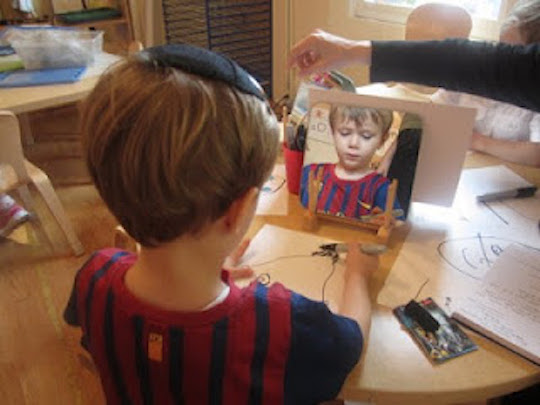
Mirror Image
by Rabbi Jonathan Gewirtz, The Observant Jew
During the days of Selichos, we’re supposed to be analyzing ourselves and preparing to greet the King. We look for imperfections that we can smooth out, spot clean, repair and begin to change. We are encouraged to take the time for reflection, viewing ourselves as if in a mirror.
There’s a problem with this process though. Chazal tell us that a person cannot see their own flaws. That’s why learning Mussar helps, because it highlights inappropriate behavior and enables us to see if it sounds familiar. But recently I found that HaShem has provided many of us with mirrors in our own homes – our children.
A quote I find humorous yet insightful states, “Children are natural mimics who act like their parents despite every effort to teach them good manners.” The truth is that our children become smaller versions of ourselves and if we want to see what kind of people we are, we can look at our kids.
My daughter recently started writing and recording a weekly Dvar Torah that she sends to her friends l’illui nishmas an uncle. I’m quite proud that she’s joined the “family business” of Torah but what’s even more shocking is that I hear her repeating concepts I’ve espoused for years. Those are the moments when I like what I see in the mirror.
What happens, though, when you see your child do something upsetting? Being rude, insensitive, acting inappropriately or simply apathetic? That’s when we have to ask ourselves where they learned this behavior. Most often they got it from us. The attitudes and perspectives we share with our children will be the attitudes and perspectives they find familiar and most likely will gravitate towards.
R’ Avigdor Miller z”l would say that when it rains, people shouldn’t tell their children, “We can’t do that because it’s raining,” or make it seem gloomy, because that’s how their children will view rain their entire lives. Instead, speak of how wonderful and refreshing it is. Instead, marvel at what a miracle and kindness it is. It will give your children a better outlook on rain – and on life, as the following story illustrates.
Each Friday, the young children of the class would have a Shabbos party. They would set a table with a white cloth, place candles, grape juice, and goodies on the table, and have a mock Shabbos meal.
One week, the teacher told Yankel it was his turn to be the Shabbos Abba/Tatty/Daddy. “Go ahead, Yankel,” said the teacher, “Take your place by the Kiddush cup and begin the Shabbos party as if you were the father leading the meal.”
Yankel slowly walked over to the seat, plopped down in the chair, loosened his tie and belt and let out a huge groan. “Ooooyyyy….” he sighed. “Hob ich gehat a shvereh voch!” (Did I have a tough week!!)
A noted educator asked 100 children to tell him something about Shabbos. 95 of them began by saying, “You’re not allowed to…” That’s a scary statistic and it reflects on us as well. Are we exuding the joy of Shabbos? Do we visibly anticipate it each week? If we don’t see it in our kids, then we’re probably not setting that example.
Sometimes we not only model incorrect behavior, but incorrect attitudes. I was trying to pull into a parking spot at a busy shopping center. A woman and her daughter were unloading their wagon into their car. In the spot next to them sat a shopping cart, effectively blocking me from pulling in. I rolled down my window to ask the woman to move it but as she wasn’t looking at me and didn’t look to be Jewish, I opted not to bother her. I kept my blinker on so I could take her spot when she left. Having finished unloading their cart, the daughter moved it to the aisle of a handicapped space. As she came back she noticed me and asked her mother, “Should I move that other cart so he can pull in?”
“No,” replied the mother, shaking her head. “We don’t have to do that.” BAM! You just taught your child not to think of others. You do what you feel you have to do, not what you can do for others. Not only that, you just showed your true nature. Try looking in that mirror, Ma’am, and see if you could do with some change.
Some Gedolim never had children of their own, like R’ Henach Lebowitz or the Lubavitcher Rebbe. Despite this, they have thousands of students and followers who emulate their great midos of reaching out to others and spreading Torah and Mitzvos.
As we approach the day when we declare HaShem’s majesty, let us use the world around us as a mirror to see how we’re affecting it and whether we’re being loyal subjects of the Crown. It’s not too late to improve our appearance.
© 2018 – All Rights Reserved
Did you enjoy this column? Feedback is welcome and appreciated. E-mail info@JewishSpeechWriter.com to share your thoughts. You never know when you may be the lamp that enlightens someone else.